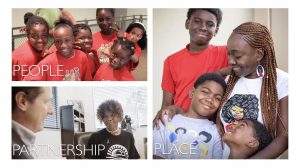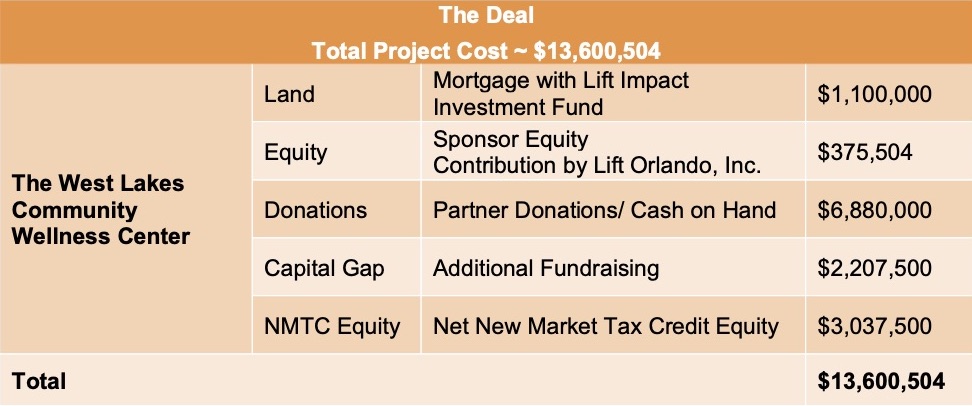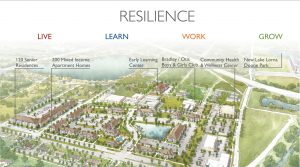Post From Community Close Ups
Founded in 2013, Lift Orlando is a non-profit organization that invests in the power of the neighborhood by placing focus on people, place, and partnership. The organization was founded by a group of business leaders who were driven to partner with residents to break the cycle of poverty. With a vision of breaking down the systemic barriers that prevent underinvested communities from achieving health and wellness, Lift Orlando works on neighborhood revitalization with a focus on neighborhoods that have been historically disinvested along racial and economic lines. Their first neighborhood reconstruction project launched a partnership with Florida Citrus Sports that aimed to revitalize the neighborhoods surrounding the Camping World Stadium, an area rich with African American heritage. Now, working in tandem with community partners, Lift Orlando shepherded more than $100 million in financial investments into the 32805 ZIP code in Orlando, Florida also known as the Communities of West Lakes.

Photo/courtesy of Lift Orlando
By the end of 2014, Lift Orlando joined residents of the West Lakes Community already working to organize the Economic Opportunity Council designed to partner with outside groups. As a result, Lift Orlando adopted a place-based, holistic approach developed by Lift Orlando’s Atlanta-based strategic partner, Purpose Built Communities. The Purpose Built Communities’ framework, “the community quarterback model” focuses on implementing mixed-income housing, a cradle-to-college education pipeline, and increased community wellness all within a defined neighborhood geography. Lift Orlando added a fourth pillar to this model, long-term economic viability, and is joining the ranks of communities around the country, who, like The Villages East Lake in Atlanta, are eradicating generational poverty. As the community quarterback, Lift Orlando brings together community stakeholders around a common agenda, shared measurements, mutually reinforcing activities, and continuous communication. They invest in people, places, and partnerships through applying a Collective Impact Approach “that brings together residents, local businesses, nonprofits, and other partners with the shared goal of transforming the community”.
Working side-by-side with community partners, Lift Orlando provided affordable mixed-income housing by replacing an old apartment complex with 200 mixed-income apartment homes, named Pendana at West Lakes. In May of 2020, Pendana at West Lakes Senior Residences opened and added an additional 120 affordable units, equipped with handicap accessible floor plans and amenities for the unique needs of senior citizens. In partnership with the healthcare system, AdventHealth, Lift Orlando opened the state-of-the-art West Lakes Early Learning Center which caters to the needs of the younger community members. The center accommodates up to 150 children, aged 6 weeks to preschool, and provides wraparound services, including an on-site clinic, nutritional resources, and events intended to foster a true sense of community among the families who call West Lakes home. Other Lift Orlando projects include Jacqueline Bradley and Clarence Otis Family Branch Boys & Girls Club and Lake Lorna Doone Park. These projects are part of Lift Orlando’s Healthy Neighborhood Ecosystem that will soon include a wellness center that will further support the health and prosperity of residents.
When Lift Orlando implemented community wellness as a third pillar, the organization aspired to build more than a health clinic. Studies suggest that simply placing a health clinic in a community alone does not automatically translate to better healthcare utilization and outcomes. Instead, Lift Orlando focused on pairing healthcare services with broader initiatives to improve wellness. These efforts would center community well-being, such as building and reinforcing connections with neighbors. One aim of reimagining the community center to function as more than an access point is to increase resident utilization, including the use of healthcare services. This broader conceptualization for community health would include the creation of spaces where residents can catch up, have a cup of coffee or take a fitness class, while also receiving primary and preventive care with a suite of wraparound services.
Lift Orlando focused on pairing healthcare services with broader initiatives to improve wellness. These efforts would center community well-being, such as building and reinforcing connections with neighbors.
In 2020, Lift Orlando officially announced their partnership between three of the largest health care organizations in central Florida: AdventHealth, Orlando Health, and the health insurer, Florida Blue. In early 2021, Lift Orlando received a grant from Dr. Phillips Charities, providing the final funding needed to break ground on the project. With their support, the West Lakes Community Wellness Center is expected to open in late 2021. The center will provide a state-of-the-art home to a comprehensive community health and wellness center for residents, which will include healthcare services delivered by a Federally Qualified Health Care (FQHC) provider. In addition, the facility will offer a community cafe, community gathering spaces, a financial wellbeing center, community offices, and a fitness facility. It is also expected to add a minimum of 40 full-time equivalent jobs.
Key Stakeholders: Lift Orlando, AdventHealth, Orlando Health, Florida Blue, Dr. Phillips Charities.
Financing: LIIF fund, real estate dollars, fundraising, corporate, partner donations, New Market Tax Credits.
Project status: Opening 2021
Project scale: $13,600,504 30,000-sq ft, two-story building.

Click to view project financing details PDF
The West Lakes Community Wellness Center, a $13,600,504 project, required multiple funding partners, funding sources, and leveraged several financing tools. The Lift Orlando’s Impact Investment Fund (LIIF Fund) acquired the real estate used for The West Lakes Community Center prior to the development of the wellness center. A significant portion of the funding sources came from donations that totaled $6,880,000. This includes contributions from AdventHealth, Orlando Health, Florida Blue, and individual donors. Lift Orlando closed the capital gap by fundraising an additional $2,207,500 through a grant from Dr. Phillips Charities. The West Lakes Community Wellness Center project also qualified for the New Markets Tax Credit (NMTC) Program, a program that incentivizes community development through the use of tax credits that attract private investment to underinvested communities. This allowed Lift Orlando to secure $3,037,500 in NMTC equity, and as part of a requirement by the program, Lift Orlando provided $375,504 as sponsored equity towards the project.
The LIIF Fund is the first social impact investment fund in Orlando dedicated to real estate. It aims to stimulate economic redevelopment within the Communities of West Lakes while also preventing the negative effects of gentrification and displacement. While the fund does not offer a market rate return, it does provide a 2%, non-compounding annual return, and when the fund makes a transaction on a property, 20% goes back to investors on top of the 2% premium.

Photo/The West Lakes Community Campus
LIIF Fund allows Lift Orlando to purchase land proactively while also providing a vehicle for healthcare partners to invest. Through strategic investments made by two healthcare systems, AdventHealth and Orlando Health, the fund raised a total of $9.4 million. Orlando Health invested $5M to the fund while AdventHealth provided $4M and gave an additional $1M of unrestricted funds to Lift Orlando’s operations.
To date Lift Orlando has deployed $4.44 million in real estate acquisitions within the 32805-zip code of Orlando, Florida. This includes acquiring a total of 7 properties covering over 4.3 acres of land that houses the affordable housing units, the early learning center, the Boys and Girls Club, and the West Lakes Community Wellness Center.
Through the use of the LIIF Fund and New Market Tax Credits, Lift Orlando leveraged two innovative financing vehicles at key points of the project. In 2016, the LIIF Fund purchased the land before identifying the partners and funding sources for the wellness center. This allowed Lift Orlando to make an early strategic investment that was more flexible and dynamic than typical philanthropy.
Eddy Moratin, President of Lift Orlando, refers to the use of NMTC as “the last mile instrument to get you to that final stretch. It is [when your project] is shovel ready but you are just shy of what you need,” Moratin explains. NMTC uses a sophisticated form of debt to create capital that allowed Lift Orlando to secure the last $3,037,500 without requiring any additional fundraising.
The LIIF Fund aims to stimulate economic redevelopment within the Communities of West Lakes while also preventing the negative effects of gentrification and displacement.
Early on Lift Orlando recognized the importance of engaging the city’s two healthcare systems and pursued a number of approaches including persistent relationship building and harnessing the power of data to make a financial case. First, Lift Orlando extended an invitation to the institutions’ most senior leaders (a CEO and President) to join the organization’s Board of Directors. Engaging health partners as board members, bolstered Lift Orlando’s business partnership efforts and added to their credibility within the healthcare community. The partners’ strong reputations and expertise facilitated creation of Lift Orlando’s vision for their community revitalization goals and in crafting “the ask”. Creating entry points for continuous but critical conversations with other senior leaders from the healthcare systems proved to be a very effective component of Lift Orlando’s healthcare engagement strategy.
Another critical approach adopted by Lift Orlando was leveraging health data to make their financial case to healthcare. Using geographic data from one of the healthcare systems they were able to show that residents in the ZIP code of West Lakes frequently visited the hospital systems for emergency room care. The 10,000 annual ER visits added up to $14 million in emergency care visits. The data also revealed that there are fewer critical health access points, such as pharmacies, doctor’s offices, and gyms, in the Communities of West Lakes when compared to other wealthier ZIP codes that contributed to the stark difference in health outcomes. By demonstrating the financial costs of emergency room services by the uninsured and poorer health outcomes of residents, Lift Orlando made the financial case to local hospitals to move upstream to invest in overall community health. Eddy Moratin, President of Lift Orlando, pointed out that healthcare is the only sector largely represented in every market that has a vested interest in a community’s health and wellbeing. “If there is little to no access to preventive care, healthcare institutions can write all the checks they want to charities and still never catch up because of emergency care usage. Instead, this is an upstream investment that stems the tide of a future crisis or future demand on those services that go unpaid,” Eddy Moratin explained.
Lift Orlando plans to evaluate and measure community health outcomes using two different methods. The first includes working with their external evaluator, Polis Institute, to track facility use and to evaluate impact at a population level using these indicators:
As a community quarterback, Lift Orlando strives to maintain collaboration between community stakeholders working towards a common vision of a healthy and thriving neighborhood. Therefore, an additional evaluation effort will include a Collective Impact approach that will ensure that stakeholders are working collaboratively to reach as many residents as possible through their wraparound services.
Lift Orlando continues to leverage assets in the neighborhood along with the resources of the broader community with the intent of achieving measurable results in asset-based neighborhood transformation. In 2021, Lift Orlando hopes to create an extension of their work team and staff to increase their capacity to drive resident engagement.
Lift Orlando’s approach to neighborhood transformation, including the creation of the LIIF Fund, is tied to a vision of the future where gentrification will no longer be a concern. With a focus on how these efforts positively affect residents, Lift Orlando is hopeful their work will continue to support a way for community members to benefit from the investments that happens in their own neighborhoods and to enable and empower residents to find a way to be active in their community.